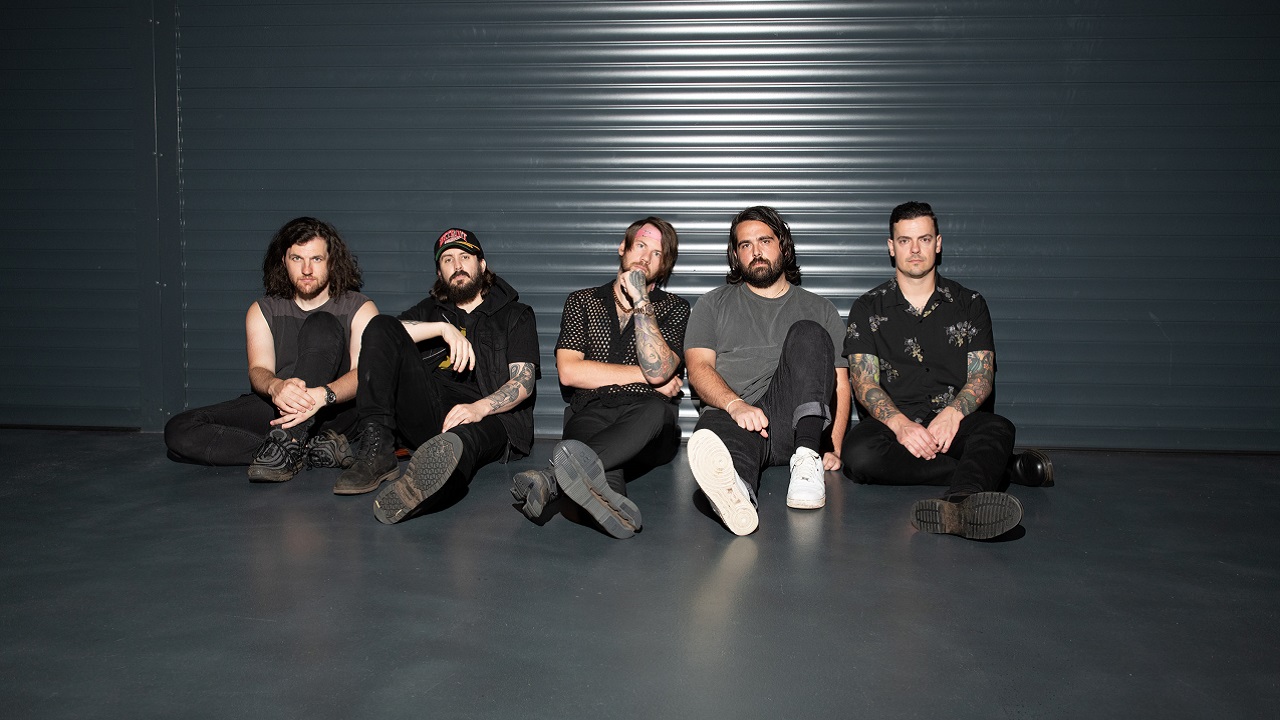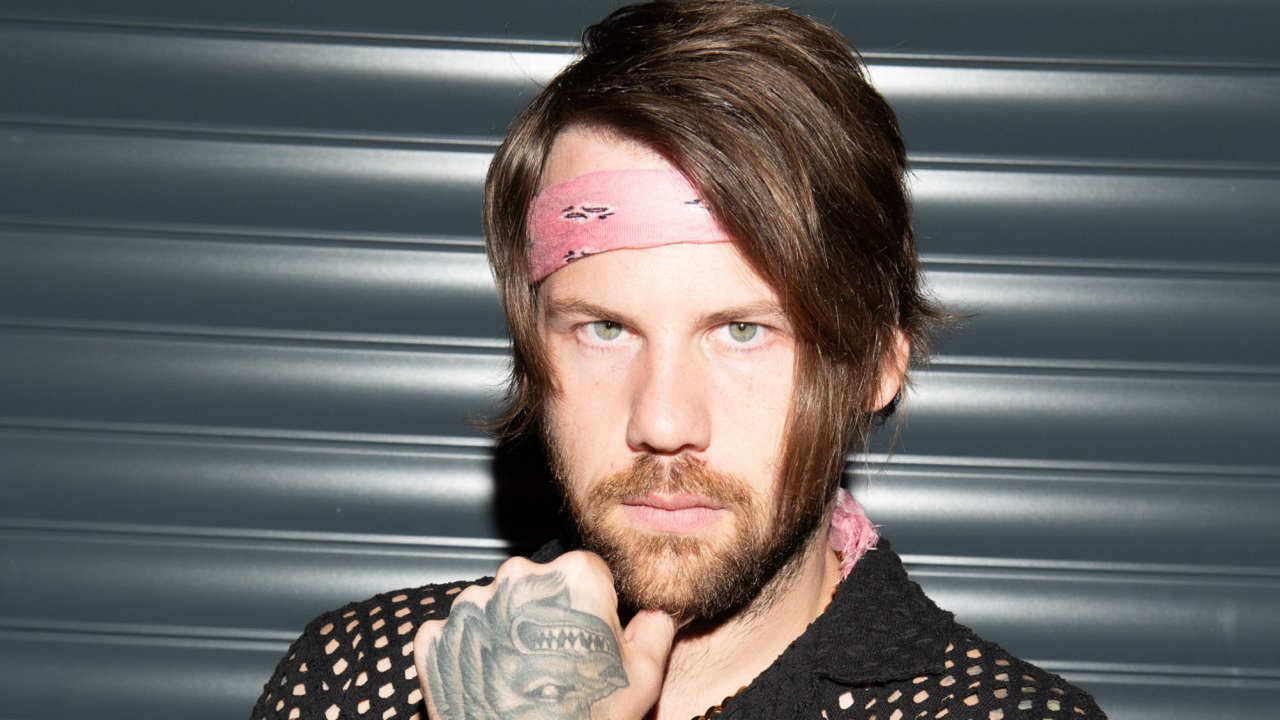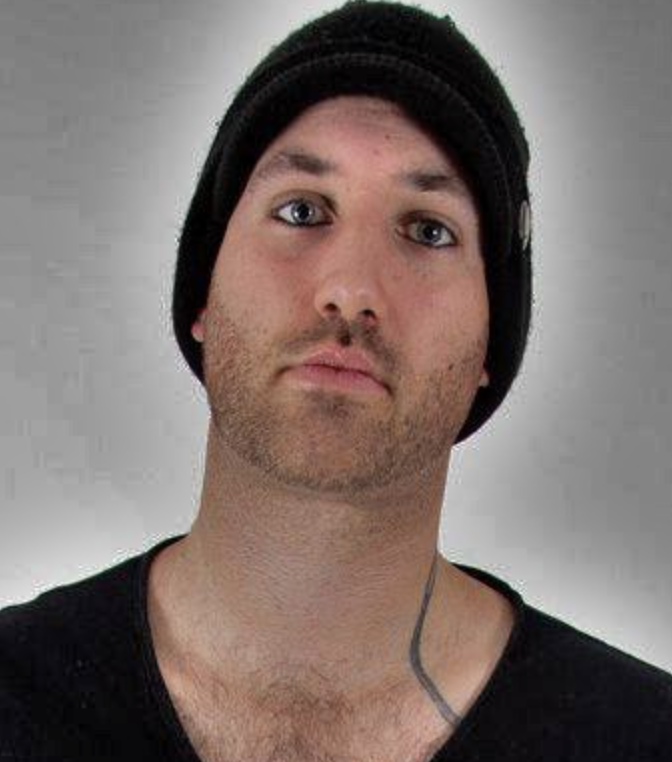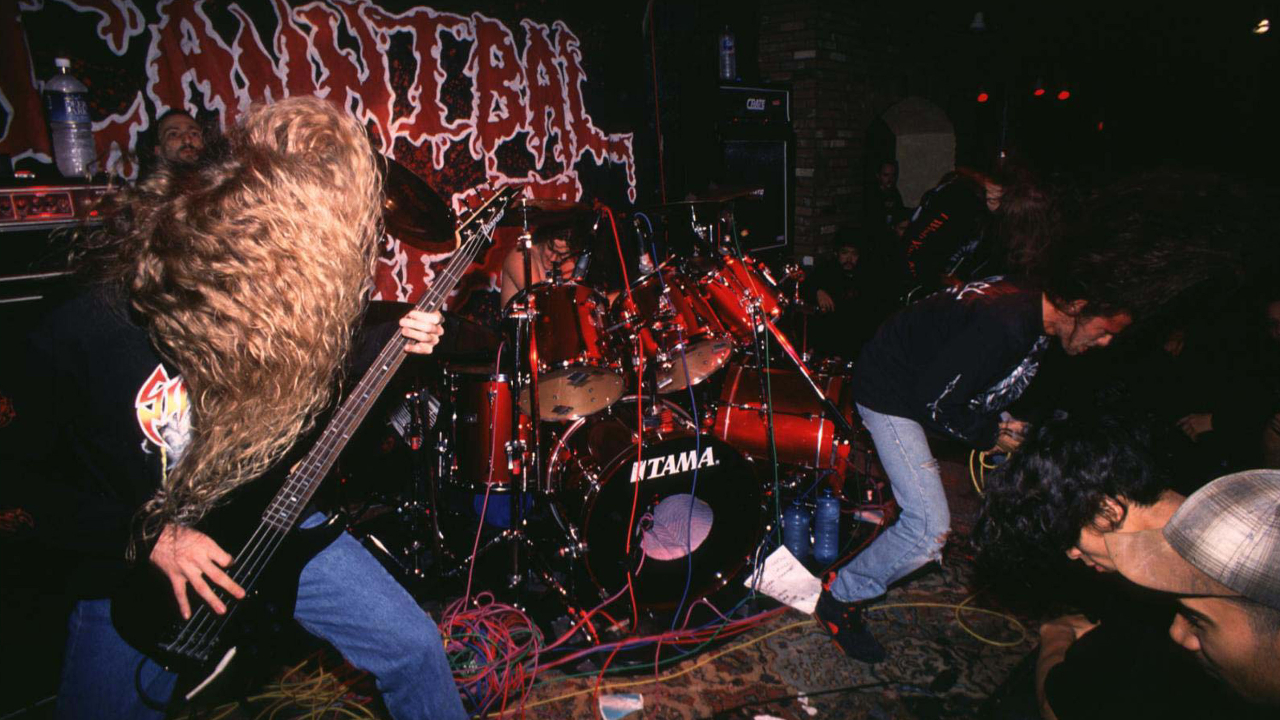"I did not save your life, but I can be an avenue that helps you": Beartooth's Caleb Shomo is a reluctant rock star, but the one metal desperately needs
Beartooth's Caleb Shomo has never shied away from talking mental health, but new album The Surface is all about embracing positivity

There’s a venue like Krakow’s Klub Studio in every city on the planet – functional, modestly sized, anonymous. But right now it looks like a prison riot is taking place in this one. Bodies are crashing into each other, drinks are cartwheeling through the air and there’s a distinct sense that something is about to get broken. Standing in the middle of it all is the architect of this chaos.
Stripped to the waist, tattoos glistening with sweat, holding a guitar above his head, Beartooth frontman Caleb Shomo is a whirling one-man wrecking crew whose charisma exudes from every pore. Amid the carnage, he’s the absolute focus of everyone’s attention. It’s the end of Beartooth’s set, and as his band peal out deafening closer The Last Riff on the stage behind him, Caleb is hoisted aloft by this seething mob and carried around the venue, wrangling noises out of his guitar as he goes, looking like one part sacrificial victim and one part messiah.
The Klub Studio is a fine enough venue, but Beartooth – and their frontman in particular – are way too big for it. Rewind a few hours, and Caleb is sitting with Hammer in The Klub Studio’s altogether calmer backstage area. The combination of magnetism and confessional self-doubt that makes him such an electrifying personality on record and onstage is evident offstage too.
He clearly worships and has learned from the greats he grew up listening to: AC/DC, Metallica, System Of A Down and Avenged Sevenfold. He even rocks a bandana (today’s is pink). It’s an alchemy that gives him the air of a bona fide rock star, a scarce commodity these days. Except Caleb doesn’t see it like that. “I’m not a rock star,” he says, shifting uncomfortably in his seat. “Definitely not.”
His response is genuine, but it’s clearly not true from where we’re sitting. Because if Caleb Shomo isn’t a modern rock star, then who is?
Five hundred years ago, Krakow was the capital of Poland and it wears its medieval history with pride. But the area in which Klub Studio is located looks like a throwback to the Communist era of the 70s and 80s, when Poland was a satellite of the old USSR.
The concrete housing estates sit under a slate grey sky that drizzles with rain. Beartooth’s summer so far has consisted of a US co-headlining tour with Trivium, Australian dates with Pierce The Veil, and a current run of European festivals. They could have had a day off today, but instead opted to stop off here and play the show. In all honestly, it looks like a decision they’re regretting.
Sign up below to get the latest from Metal Hammer, plus exclusive special offers, direct to your inbox!
“It’s been brutal,” says Caleb with a sigh, when we meet him and the rest of the band mid-afternoon. “We’re exhausted, but it’s all good.”
Things aren’t going to get any less busy for Beartooth. They are about to release their fifth album, The Surface. Without question, it’s the most anthemic they’ve ever sounded. Songs such as The Better Me and Might Love Myself are impassioned calls to arms that emphasise the power of a positive mindset. It’s the kind of album you’d expect from a band whose last UK gig was in front of several thousand people at Wembley Arena – their biggest headlining show to date.
“Every album I’ve ever made with this band has always been about capturing how I was feeling at that specific time and putting it to music,” Caleb says, as we find a few wooden crates at the back of the venue to sit and talk on. “And I really felt like I’d cracked it this time, in that I’d found a way to be happy.
That’s not the whole story, though. While Caleb is pushing the idea of manifesting positivity, there’s still an underlying sense of darkness and existential dread lurking just below the album’s surface. The singer has always talked freely about his lifelong struggles with mental health issues. Today he describes Beartooth’s last album, 2021’s Below, as “the darkest moment of my life”.
When he explains the theme of his lyrics, he recounts deeply personal, sometimes heartbreaking stories from his life, all the while holding eye contact and rarely struggling to articulate himself. But it’s a different story when it comes to turning the mirror on Beartooth and Caleb himself.
Over the last 10 years, they have risen to become one of the most exciting bands in the modern metal scene, and The Surface channels the ambition that has got them to this point. But ask the singer how he feels about the importance his band and Caleb himself have to so many people, and the words slow down and he stares at the floor.
The guy who will stand in the middle of the Klub Studio floor later tonight, acting as a lightning rod for the chaos, is nowhere to be seen. “I get a lot of people that say ‘You saved my life,’” he says. “I’ve been very open about the fact that I did not save your life, but I can be an avenue that helps you. I tell them, 'I didn’t save your life, you saved your life.’ I’m no saviour, I’m no prophet, I’m no higher power. I’m just a guy trying to rock.”

Given Beartooth’s current status an arena-headlining band, it’s easy to forget that they started in 2012 as a bedroom project in Caleb’s hometown of Columbus, Ohio. The singer had just bailed out of ‘crabcore’ outfit Attack Attack!, a band he had joined four years earlier at 15 and made three albums with. He poured everything into this new project, writing and playing everything on every piece of music they’ve recorded to date.
When he says Beartooth are his life, he’s not exaggerating. Today, he’s keen to credit the current line-up as “the greatest ever version” of the band. Drummer Connor Denis and guitarists Zach Huston and Will Deely, all of whom have been in the band since 2018 in one form or another, are, respectively, “the greatest rock drummer of all time”, “the coolest amalgam of metal” and “a guy that is so in love with the guitar”. Bassist Oshie Bichar, who joined in 2014 and is the longest-tenured member aside from Caleb, is “my confidant, the Silvio to my Tony Soprano”.
But while his enthusiasm and respect for his bandmates is genuine, it’s indisputable that Caleb is Beartooth - something that appears to weigh heavily on him at times. “To be really honest, it’s something I’ve been struggling with for a while,” he says. “I can’t remember the last time I wasn’t ‘the singer in Beartooth’. It’s been a while since I was just me. The new record has been a long, gruelling process.”
The Surface is partly the product of Caleb’s attempt to work out what Beartooth is, and what it means to him. In the aftermath of the raging Below, he was feeling confused and pissed off. He decided to take stock of his life, and he didn’t like what he saw. He realised the music had morphed beyond a passion project and into something that completely defined him as a human being.
“Beartooth, in a way, is just me explaining my personal life and documenting it in real time,” he says. “But it does become hard when my personal life has become my job. I feel very blessed that this is the scenario that I’m in, but I don’t feel like I have any time for me. All of my energy has gone into this band, has gone into Beartooth. It’s kinda draining to be honest.”
Caleb decided to embark on what he calls “a massive shift in my life, in my personal life”, starting with trying to understand why the sole outlet for his problems was, seemingly, not giving him the personal peace he craved.
“It made me think about all of the Beartooth material,” he says. “I just felt like I had documented some really dark shit. They’re all really fucking sad, they’re all really depressing. I’ve realised over the years that, trying to grow up and trying to discover who I am in this environment has taken its toll on me.
A lot of people relate to me and relate to what I said, but it all comes with a price. The price for me was that I was just falling apart, I was a complete mental wreck. I am already predisposed to depression and mental health problems, I knew they were going to be a part of my life, but sometimes they felt like the only part of my life.”
The Covid lockdown was tough. His alcohol consumption reached an all-time high and he found himself becoming bulimic, an eating disorder he had originally suffered from as a teenager. One night, unable to sleep due to the unbearable stomach cramps brought on by the condition, he decided to take control of the situation.
“I felt so helpless,” he says. “I had this moment of clarity where I thought, ‘You need to say something to someone right now.’ So I shook my wife and woke her up and told her, ‘I have been pretty bulimic for the last three or four months and I just need you to know that.’ That was a really big moment for me in my life: the realisation that I could take control of my life. If you manifest it, then you control it.”
That realisation is at the heart of The Surface. As he worked through the recurrence of his eating disorder, Caleb also gave up drinking. He felt like all of his problems had been solved. “I wrote the first song from the record, Riptide, the week after I quit drinking,” he says.
“I was a pretty serious drinker, it wasn’t helping, it was only numbing. It was getting to a place where it was only taking and never giving. I had to rewire, learn how to function again sober.”
It created a kind of “manic high” – a brand new feeling, and one he loved. “It was so new and so different,” he says. “Instead of it being this floating, looming depressing state, it was more like very high highs, and I wasn’t really dipping that much. The beginning of the record is me going ‘everything is beautiful’ and ‘I’ve found this new way to live.’”
As Caleb continued writing and recording, this new mindset initially felt totally alien to him. “Sometimes it’s really hard to grasp positivity, to even know how to understand that as a language. I really didn’t even understand how to express that mindset until…” He pauses for quite a long time. “Until about two years ago. This record is me understanding what I can do to continue on with this thing that I love so very much without it eating me alive.”
Except life is never simple. In the middle of all this positivity, Caleb was delivered a massive blow when his grandfather died from cancer. “I was very close to him,” Caleb says quietly. “When I got that call saying, ‘You have to come out and see him, it’s getting to that time’… it’s really hard having to face that and deal with that.”
The Surface reflects the idea that life is never as simple as ‘good times’ and ‘bad times’, that it’s a complex, ever-changing churn of emotions. “It would be really easy for people to look at this record on first glance and think it is all about pure positivity, that I’ve figured my life out and now I’m happy,” Caleb says.
“But in the middle of the record it takes this pretty sharp shift. There are a few songs in the middle dealing with loss. The song What’s Killing You, it’s me coming back to Earth and realising I’m still Caleb, I’ve not been cured and I’m not this totally different person.”
The Surface ends with a song titled I Was Alive, written in the wake of his grandfather’s death to celebrate the life he had led. After the emotional see-saw that precedes it, it concludes the album with a hit of positivity and hope. “It was about the final conversation we had,” he says, smiling at the memory.
“It was so fucking powerful hearing somebody I looked up to, who lived one of the most impressive lives that I’ve ever seen, saying, ‘Yeah, I did it. I lived my life, I did everything I wanted to do and I have no regrets.’ All he did throughout all of that was to spend his life trying to love other people and explore the world. And I can really relate to that as a musician. That song is me manifesting my own existence and how I want to carry on for the rest of my life.”

Caleb describes the release of The Surface as “the closing of the book, and on to the next chapter” of Beartooth. Even though he’s not sure what exactly that is going to look like.
“I don’t know,” he shrugs. “But I’ve just realised that it is so easy to be negative and hateful, because that is all that you are force-fed in this world. I have found that I am way more impactful in the world when I work on myself, because I am what’s going out into the world.”
And with that, a man who is simultaneously the most natural yet reluctant rock star operating today heads off to prepare for a show that will see him throwing himself around the stage with little regard for safety, the public Superman to the private Clark Kent.
The last time we see him is where we came in: high above the crowd’s heads, attacking the guitar that’s still in his hands. It’s a scene that belies his earlier assertion that he wasn’t a rock star.
“I’m not,” he said, shaking his head. “I will always just be a guy helplessly in love with rock’n’roll. I am going to be the best version of Caleb Shomo, Beartooth, whatever you want to call it, that I can be. I’m now way beyond anything I could have dreamed of, and I’ve removed the ceiling, there is no ceiling. Fame makes me feel uncomfortable, but when I die, I want to have given every ounce to rock’n’roll.”
Whether he’s a rock star or not is still up for debate. But Caleb Shomo giving all of himself to his music? That we do believe.
The Surface is out now via Red Bull. Support and information about eating disorders can be found at beateatingdisorders.org.uk

Stephen joined the Louder team as a co-host of the Metal Hammer Podcast in late 2011, eventually becoming a regular contributor to the magazine. He has since written hundreds of articles for Metal Hammer, Classic Rock and Louder, specialising in punk, hardcore and 90s metal. He also presents the Trve. Cvlt. Pop! podcast with Gaz Jones and makes regular appearances on the Bangers And Most podcast.
